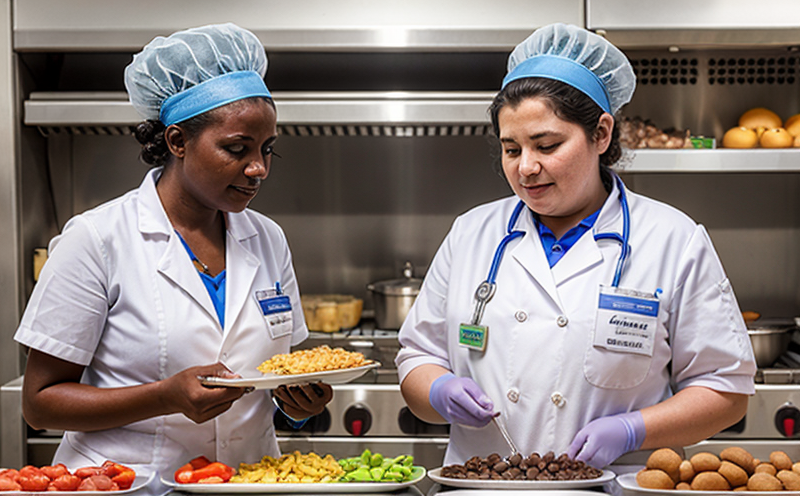
-
Food Safety and Testing-
Food Safety for Special Populations-
Ensuring Safe Food for People with Diabetes
We provide comprehensive solutions designed to help our clients mitigate risks, enhance performance, and excel in key areas such as quality, health & safety, environmental sustainability, and social responsibility.
Discover
For many years, our organization has been operating successfully, boasting modern laboratories that meet international standards. These laboratories are equipped with the latest technology devices and equipment, and we have built a strong team of experienced and trained personnel to operate them.
DiscoverWelcome to Eurolab, your partner in pioneering solutions that encompass every facet of life. We are committed to delivering comprehensive Assurance, Testing, Inspection, and Certification services, empowering our global clientele with the ultimate confidence in their products and processes.
Discover
-
Food Safety and Testing-
Food Safety for Special Populations-
Ensuring Safe Food for People with DiabetesEnsuring Safe Food for People with Diabetes
Living with diabetes requires careful management of blood sugar levels, diet, and lifestyle habits. One crucial aspect of managing diabetes is ensuring safe food choices to prevent complications and maintain overall health. In this article, we will discuss the importance of safe food selection for individuals with diabetes, highlight common pitfalls, and provide guidance on how to make informed decisions when it comes to food.
Understanding the Risks
Food safety is particularly crucial for people with diabetes due to their increased susceptibility to infections and complications related to poor blood sugar control. Certain foods can exacerbate diabetes-related health issues, such as kidney disease, nerve damage (neuropathy), and vision problems (retinopathy). Moreover, foodborne illnesses can further compromise the immune system, making it challenging for individuals with diabetes to manage their condition.
Safe Food Selection
To ensure safe food choices, individuals with diabetes should follow these guidelines:
Fruits like berries (strawberries, blueberries, raspberries), citrus fruits (oranges, lemons, limes), and apples are good options due to their low glycemic index and high fiber content.
2. Can I eat sugary foods if Im taking medication for diabetes?
No, its essential to avoid or limit sugary foods even if youre taking medication. These foods can cause blood sugar spikes, which may require adjustments to your medication regimen.
3. How do I choose healthy fats?
Opt for unsaturated fats like avocado, nuts (almonds, walnuts), and seeds (chia, flax) over saturated fats found in red meat, full-fat dairy products, and processed snacks.
Conclusion
Ensuring safe food choices is a critical aspect of managing diabetes. By following the guidelines outlined above and being mindful of potential allergens, fermented foods, and common pitfalls to avoid, individuals with diabetes can make informed decisions when it comes to food selection. Prioritizing whole, unprocessed foods and controlling portion sizes will help regulate blood sugar levels, maintain overall health, and prevent complications related to poor food choices.

Environmental Simulation Testing
Environmental Simulation Testing: A Comprehensive Guide In todays world, where technology is rapidl...

Trade and Government Regulations
Trade and government regulations play a vital role in shaping the global economy. These regulations ...

Food Safety and Testing
Food Safety and Testing: Ensuring the Quality of Our Food As consumers, we expect our food to be sa...

Chemical Safety and Certification
Chemical safety and certification are critical in ensuring the safe management of products and proce...

Consumer Product Safety
Consumer Product Safety: Protecting Consumers from Harmful Products As a consumer, you have the rig...

Automotive Compliance and Certification
Automotive Compliance and Certification: Ensuring Safety and Efficiency The automotive industry is ...

Military Equipment Standards
Military Equipment Standards: Ensuring Effectiveness and Safety The use of military equipment is a ...

Transportation and Logistics Certification
Transportation and Logistics Certification: A Comprehensive Guide The transportation and logistics ...

Lighting and Optical Device Testing
Lighting and Optical Device Testing: Ensuring Performance and Safety Lighting and optical devices a...

MDR Testing and Compliance
MDR Testing and Compliance: A Comprehensive Guide The Medical Device Regulation (MDR) is a comprehe...

Construction and Engineering Compliance
Construction and Engineering Compliance: Ensuring Safety, Quality, and Regulatory Adherence In the ...

Hospitality and Tourism Certification
Hospitality and Tourism Certification: Unlocking Opportunities in the Industry The hospitality and ...

Railway Industry Compliance
Railway Industry Compliance: Ensuring Safety and Efficiency The railway industry is a critical comp...

Healthcare and Medical Devices
The Evolution of Healthcare and Medical Devices: Trends, Innovations, and Challenges The healthcare...

Cosmetic Product Testing
The Complex World of Cosmetic Product Testing The cosmetics industry is a multi-billion-dollar ma...

Industrial Equipment Certification
Industrial equipment certification is a critical process that ensures industrial equipment meets spe...

Pharmaceutical Compliance
Pharmaceutical compliance refers to the adherence of pharmaceutical companies and organizations to l...

Electrical and Electromagnetic Testing
Electrical and Electromagnetic Testing: A Comprehensive Guide Introduction Electrical and electrom...

Electromechanical Safety Certification
Electromechanical Safety Certification: Ensuring Compliance and Protecting Lives In todays intercon...

Renewable Energy Testing and Standards
Renewable Energy Testing and Standards: Ensuring a Sustainable Future The world is rapidly transiti...

Energy and Sustainability Standards
In today’s rapidly evolving world, businesses face increasing pressure to meet global energy a...

Product and Retail Standards
Product and Retail Standards: Ensuring Quality and Safety for Consumers In todays competitive marke...

Environmental Impact Assessment
Environmental Impact Assessment: A Comprehensive Guide Environmental Impact Assessment (EIA) is a c...

Fire Safety and Prevention Standards
Fire Safety and Prevention Standards: Protecting Lives and Property Fire safety and prevention stan...

Agricultural Equipment Certification
Agricultural equipment certification is a process that ensures agricultural machinery meets specific...

IT and Data Center Certification
IT and Data Center Certification: Understanding the Importance and Benefits The field of Informatio...

NEBS and Telecommunication Standards
Network Equipment Building System (NEBS) and Telecommunication Standards The Network Equipment Bu...

Battery Testing and Safety
Battery Testing and Safety: A Comprehensive Guide As technology continues to advance, battery-power...

Aviation and Aerospace Testing
Aviation and Aerospace Testing: Ensuring Safety and Efficiency The aviation and aerospace industr...

Pressure Vessels and Installations Testing
Pressure Vessels and Installations Testing Pressure vessels are a critical component of various ind...